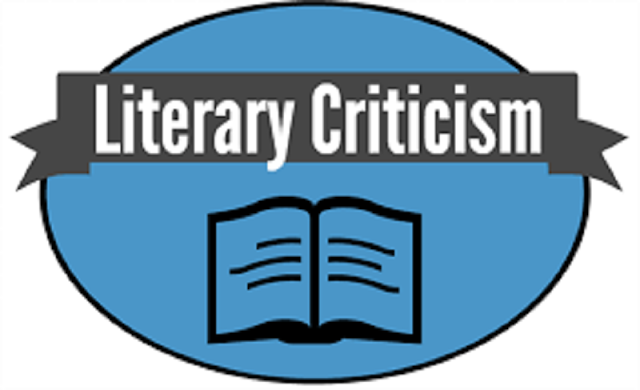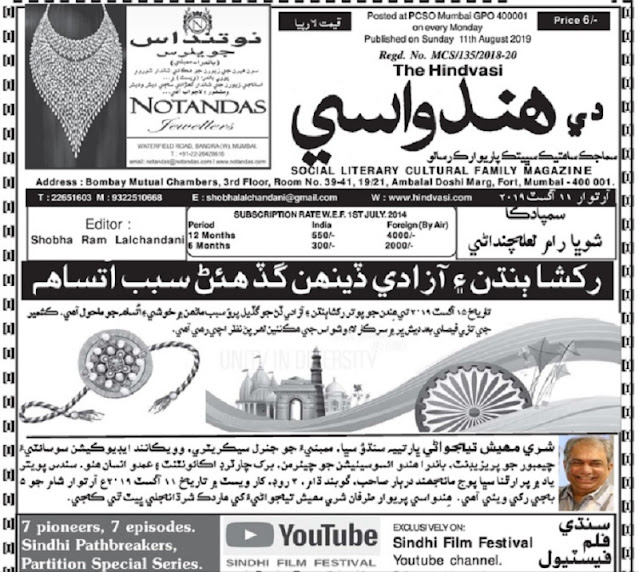Lack Of Criticism In Urdu Literature Of Pakistan
A few days back I posted a post on
social media regarding Urdu Literature being created in Pakistan, saying:
“Pakistani Urdu literature being
created nowadays is like that tobacco paan that one spits out immediately
without a second thought.”
Some of my social media friends
accused me of hate speech, while some others called it a sweeping statement,
while some asked: “why to criticize Urdu literature only?”
According to me this is neither hate
speech, nor a sweeping statement, it has firm grounds, firstly, I came to this
conclusion by reading Urdu novels and short stories that have been published in
recent past, secondly even the scholars of Urdu literature have mentioned this in
their research works.
In answer to why only Urdu literature;
as a writer and reader I am free to give my opinion on literature of every
language, secondly Urdu literature has more readers in Sindh as compared to
rest of Pakistan. In this regards I had a discussion with an employee of
Fiction House, Hyderabad and he told me Urdu literature has more readers in
Sindh as compared to rest of the country. He also claimed that even though Urdu
publishers have been unable to touch the market of Sindh properly.
Recently I have come across with Urdu
novels and short stories like Jagy Hain Khuwab Main, Sasa, Char Darvesh Aur Aik
Kachuwa, Ratain Meerwah Ki, Bahao, Jab Shama Jali, Lahoo Lahoo Wadi, Do Loog
(Indian novel) and in short stories Khaani Bol Parhi and some other books. After
reading these novels and short stories I have come to conclusion that Urdu
literature in Pakistan has lost its glory.
However, there is no doubt that
quality work in field of translation is being done in Urdu, though people like
Nangar Chana and others are doing a fair job in field of Sindhi translation but
a lot of work is required as far as translation is concerned in Sindhi.
Right from the beginning Pakistani
literature has gone through some basic problems, which have been never resolved
at the state level, in Pakistan arts and literature have never been taken
seriously, and have been ignored. Here are few major problems related to
literature being created in Pakistan:
(i)
Lack
of freedom of expression: To create something a creator requires complete
freedom so that his/her thoughts and ideas are completely expressed. Writers,
journalists and intellectuals across the world have given endless sacrifices to
gain freedom of expression. It is the power or right to express one's opinions without censorship,
restraint, or legal penalty. According to the Universal Declaration of
Human Rights, freedom of expression is the right of every individual to hold opinions
without interference and to seek, receive and impart information and ideas
through any media and regardless of frontiers. But unfortunately
Pakistan is among those few states, where there is hardly any concept of
freedom of expression. Every new idea and thought is considered blasphemous, you
just open your mouth to say something and people start getting offended, you
are labelled with tags like traitor and a threat to national security. Since a
creator doesn’t get complete freedom of expression, likewise he/she doesn’t
allow any freedom to others.
(ii)
Pakistani writers are only Right or Left
wingers: As Pakistan was formed on pure religious grounds, so at state level
propagation of a particular religious ideology was promoted, due to which the
diverse values were oppressed, this had a negative impact on everything
including Pakistani literature. Writers ignored every other theory and they
became either right wingers or left wingers (progressive), they kept on
promoting their respective ideologies, for them political ideology was more
important than techniques of different literally genres, and both of these
groups became two sides of the same coin, their sole aim became revolutionization
of society with their respective ideologies, as Marxist literary theory defines
it: to promote the idea that literature should be a tool in the revolutionary
struggle. It attempts to clarify relationship of literary work to social
reality. It is political in nature. It aims to arrive at an interpretation of
literary text in order to define political dimensions of the literary work.
(iii)
Ignoring
the literary trends: As Pakistani writers just took their positions in two
above mentioned camps, they completely ignored other literary trends like surrealism,
magical realism, existentialism, modernism, post-modernism, feminism, fantasy
and other such important literary trends.
Lack of Criticism in Pakistani Urdu
Literature:
Renowned Sindhi novelist and short
story writer Rasool Memon while giving a lecture at Karachi claimed that the
Urdu literature being created in Sindh, is not connected to the land, and it
would loose its importance if it is not connected to the land.
Criticism is considered as an
important aspect in literature, it doesn’t mean to degrade but to correct the
mistakes and pointing out shortcomings. The problem with Pakistani Urdu
literature is that there is hardly any criticism. In this regards Rafaqat Razi
in preface of a book titled Fiction, Discourse and Cultural Spatiality writes
that:
“From past three decades there has
been death like silence as far as criticism in Urdu literature is concerned.
The major reason behind this is unawareness of principals of literary criticism
and second the critics are unaware of literary theories. The result of which is
there is no proper criticism and an ordinary writing is taken as a masterpiece.
While majority of critics follow the golden principal of ‘you scratch my back, I
would scratch yours.’ Or the critics rather following the modern methods of
criticism, carry on with age old methods.”
Likewise another renowned Urdu critic
Nasir Abbas Nayar in an interview with Daily Dawn claimed that:
“Though most of the story of modern Urdu literature revolves around
resistance narratives, some exceptional episodes present us with alternative
narratives as well. I have focused particularly on discovering and analysing
the narratives that were produced by colonised people in their struggle to
emancipate themselves and to reclaim what had been lost.”
In an
answer to question regarding criticism he said that:
“No. As
far as theory is concerned, Urdu has not produced any critic of global repute.
It must be admitted that only theorists can transcend local boundaries and
influence critical minds of different cultures. In the absence of theoretical underpinning,
Urdu critics have confined themselves to writing practical criticism.
Worthwhile though it is, practical criticism, being text-oriented, remains
confined to a single language. It cannot even hope to be universal.”
So,
rather getting offended we must realize the problem and try to solve it,
otherwise nothing but garbage would be produced in the name of literature.





This comment has been removed by the author.
ReplyDeleteWhile going through this article, observing a solo narrative about the Urdu criticism, I find myself with a different opinion to substantiate both in the statements of Blogger and a bit of Nasir Abbas Nayer, however Rafaqat Razi has rightly pointed out the death like silence of critics in Urdu literature for the reasons best enumerated by the Blogger.
ReplyDeleteNevertheless, the blogger have not considered or gone through the historical events of the independence of India and root cause of creation of Pakistan. It was never created or “formed on the pure religious grounds” as claimed by the Blogger. I’m on my way to describe the events in my forthcoming book “Partition of India- A paradigm of Hasty decision” on which Jinnah was confronted and got agreed with many other prevalent reasons suitable to Royalty.
Besides, Nasir has been producing critique with his early time specialty post colonialism, as I found all his work and literary analysis has the similar nature of description and some sort of reiteration though different in characteristics of the literary genre so only considering post colonialism technique does not find a wise reasoning to evaluate the whole contemporary Urdu work.
I think Blogger has yet to read novels other than those from Karachi. In Urdu both from Pakistan and India there have been lot of good Novelists who are producing wonderful literature but they don’t have the mafias/lobbyist to reach to the readers/ masses. I’m not naming those writers and novels for the reasons to keep my deliberation brief.
Considering the wingers’ politics, Urdu criticism as claimed by Blogger “ Writers ignored every other theory and they became either right wingers or left wingers (progressive), they kept on promoting their respective ideologies, for them political ideology was more important than techniques of different literally genres.”
Purely determining the Literature on the basis of techniques is a sort of mechanical work which doesn’t apt to produce the results as it should have been achieved by the global literature and the institutions meant for the recognition of the literature in light of the global criticism. In my opinion unless a society adopts the ideology based on the humanity and mankind sustenance, how it could go thrive the cultural and economic understanding and wisdom to extract the dilemma to produce its universally reckoned literature. Simply application of techniques won’t suffice for the interpretations and expository of literary genres.